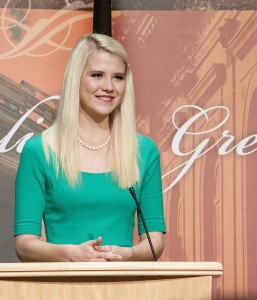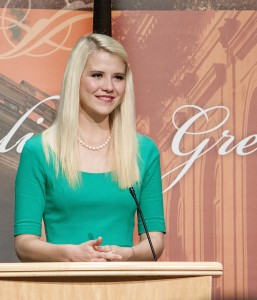Making her way to the podium, a tall, slender, blonde young woman walks across the front of the room with seamless grace and poise. Her words articulate. She tells the audience a message; “I have so much to be grateful for”.
Surprising words from Elizabeth Smart, the girl whose kidnapping at 14 headlined the news countless times and after a long nine months, was found.
With the release of her newly published book “My Story”, Smart spoke at Bowling Green State University on the afternoon of Nov. 5, giving a personal account of her time in captivity.
Though Smart is recognized for her terrible tragedy, she opens her discussion with the hardships of a young teenage girl trying to make her way through middle school and transition into high school, talking about her problems at the time with not being the most popular girl or the most outgoing.
Yet, her life and problems at hand would dramatically change in the course of a night.
Smart said she remembers bickering with her older brother as siblings do and then going off to bed, nothing out of the daily routine.“Next thing I remember is a man’s voice, a voice I didn’t recognize.” She said through the daze of her sleep Smart tried to decipher what was happening to her, and before she knew it she as being forced to run through the woods located behind her home to an unknown destination.
Taking Elizabeth was her captor, Brian David Mitchell, a self-proclaimed prophet who made the next nine months of Smarts life terrible.
Smart discussed this dark journey through the woods, “Up until that point I had nothing to really be scared of”.
The girl who worried over music lessons and math tests was now taking on a crazed man who Smart said told her, “If you make a sound or yell, I’ll kill you.”
After being taken into the woods and meeting Mitchell’s accomplice, Wanda Barzee, Smart was repeatedly raped and victimized by the two. “I was just a little girl” she said, “How did he think he could do this?” Smart began to lose all hope of ever being found or even living a good life. She wished death upon herself as she began to self-collapse in her small tent constructed out of logs and tarps. She said, “I will never forget how broken…how unworthy I suddenly became.”
But this moment of anguish and self-pity soon diminished. Elizabeth echoed the words of her mother who once told her that you’ll encounter so many people in your life, but only two of them will ever matter and that’s God and your mother. Smart channeled her faith in God to persevere through her troubles and trials.
Smart pushed through the days,“I decided what I had to do. No matter what happened, I’d do what it took to survive” she said.
After leaving before the Utah winter, Smart and her kidnappers left to California but later returned to Salt Lake City due to the clever and persuasive abilities of the young girl. “If I wanted to get found I got to get back to Salt Lake,” she said.
With this determination to survive, the three went back to Utah and then the day Smart had been waiting for. “The first day we got back to Salt Lake was the day I was found,” she said.
Smart feared that she herself would be thought of as being a part of Mitchell’s and Barzee’s crazy scheme to kidnap more girls after her, yet was later met by her father who, as Smart observed, “swept in” to save her from these people.
Despite all that transacted within these nine months, Smart gives a story of survival and triumph though self-perseverance. Smart clearly stated that she walked away from this situation knowing that no one could ever hurt her the way these two did.
Smart concluded in then stepping down from the podium and leaving the audience with these small words of encouragement “we only have a choice on how we react.”




